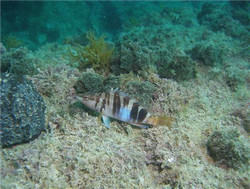Smart fish put stock monitoring practices into question
Tourism may account for 80 % of its economy, but it’s not the sunny beaches and beautiful landscapes that attracted Josep Alós and Robert Arlinghaus to the island of Mallorca. Since January 2014, the two scientists have been investigating fish populations in the region thanks to innovative mathematical models and monitoring methods. And what they found is quite disconcerting: the more fishers there are at a specific location, the less fish are inclined to take the bait. To get to this result, the researchers studied the behavioural responses of two types of fish – the carnivorous painted comber (Serranus scriba) and the annular seabream (DIplodus annularis), an algae eater, – in 54 different locations with the same habitat characteristics but different angling pressures. As fishers tried to catch their prey, an autonomous underwater video recording was used to measure the behaviour of fish. Fool me once… The painted comber, which cannot afford to think twice before attacking its mobile prey, was expected to be generally more aggressive towards baits than the seabream. But this theory was soon challenged by the facts: although they were quite aggressive in environments with low fishing pressure, the fish actually tended to become increasingly shy as the number of baits increase. According to the team, this changing behaviour could be explained both by genetic change towards increased shyness and learning from experience, resulting in increased capture avoidance. The results contrast with previous work from the two scientists, which was limited to a monitoring standard angling catch methods and led to the conclusion that marine protected areas host higher fish quantities and bigger fishes than sites with a high exploitation pressure. Seabream behaviour, on the other hand, didn’t seem to be affected by this change. ‘These results suggest that recreational angling may contribute to patterns of hyper depletion in catch rates without a corresponding change in the fish population where catch rates decline stronger than the abundance of fish’, said Josep Alós, researcher at the Leibniz-Institute of Freshwater Ecology and Inland Fisheries and co-author of the study. But does it mean that reported fish stock depletion across the world could have been influenced by clever fish behaviour? ‘Reports on the dramatic decline of fish populations in the ocean which were only based on fishery-dependent data, for example data from the long-line fishery of tuna, cod or swordfish, could also have their cause in enhanced gear-avoidance behaviour of those fishes. We have to rethink our monitoring of fish stocks and take the behavioural changes into account. Maybe some areas with high fishing intensity host more fish than we believe,’ concludes Robert Arlinghaus, study leader and researcher at the Humboldt-Universität zu Berlin. The study was funded under the FISH&FISHERS project, which aims to improve fishing mortality estimations while studying the spatial interactions between fish and fishers. Ultimately, the team hopes that their findings will contribute to better protecting marine ecosystems, preserving biodiversity and making the development of fisheries more sustainable.
Countries
Germany



